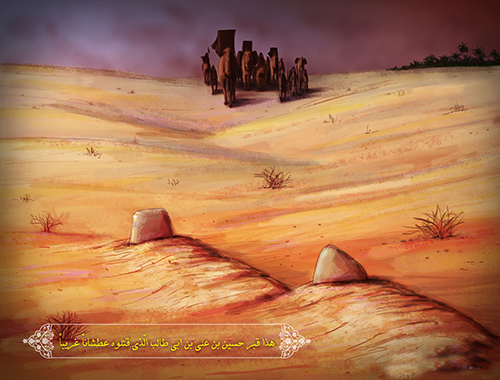Islam's approach to these questions
- Details
- Hits: 1918
Islam's approach to these questions
As for the points raised in the first four paragraphs, we have discussed them in detail in the preceding chapters of this book. Anyhow, to maintain continuity, here again we refer to them briefly:
(1) There is no doubt that there exists a definite coherence and harmony in the universe, and all the elements and phenomena of nature are minutely interrelated. That is why it is not possible to have an accurate and full knowledge of any single natural phenomenon without having a knowledge of all the elements which form it and all the causes and factors which affect it, and similarly without having a knowledge of its relationships and its evolutionary tendency.
(2) All the natural phenomena are ceaselessly and uninterruptedly in a state of motion. No material element and no natural phenomenon is static and at rest. Change and evolution, growth and decay, life and death and transformation and transfiguration are the patterns by which matter is governed.
(3) On the whole this movement is evolutionary and progressive. It is purposive, well‑calculated and wellorganized. Generally speaking, the net result of this movement of the world and its phenomena is growth, development, resistance against anti‑evolutionary factors and utilization of positive factors for evolutionary progress and a change for the better.
(4) This motion and this transformation have certain characteristics and produce certain effects in accordance with the laws concerning matter and nature. These laws affect every material thing from within and without, and influence its relationship with other phenomena. This influence may be either in the form of contradiction and conflict or in the form of harmony and agreement, or simply in the form of preserving the existence and growth of the thing concerned.
The sum total of these laws and relationships constitutes the Divine ways, the creative design and the judicious will of Allah. As we shall see, these Divine ways operate in nature and society ceaselessly and uninterruptedly.
Now we come to the main feature of our discussion relating to man and society. The Islamic point of view in this respect may be summarized as under:‑
(5) Man is a part of nature, having material and natural characteristics. But he has reached such a stage of evolution that he has become fit for being gifted with Divine spirit and supernatural values. Consequently he has acquired the faculties of free will, knowledge and responsibility. Because of these gifts, he is not subservient to the material phenomena nor bound by the genetic relationships. In contrast, he is capable of subduing nature and bringing about changes in material relationships and natural phenomena.
(6) Man, as we know, despite his being an integral part of society, is an independent being. He is not so subservient to society that he should have no personal will, freedom and the right of choice. His conduct is not determined by society and history only, though he cannot be regarded as being apart from society.
(7) As the entire existence of man is not the direct result of the evolution of matter, his mental and intellectual life cannot be purely inspired by and derived from matter or from material and genetic relationships of society. Nevertheless, as he is embedded in matter and has emerged out of it, the natural, geographical and physical conditions and the material relationship of society are bound to affect him.
(8) The contradiction which exists within man is the outcome of the conflict between his material yearnings (human desires) and his celestial impulses (inspirations from beyond this world). As man is endowed with freedom and knowledge, he should make the best use of this contradiction, and should take steps to modify all his impulses and to guide them towards his own evolution, the betterment of his surroundings, the making of history and moving it forward.
While discussing dialectical materialism, we reproduced certain views having a direct bearing on the historical conception of this school. Hence it will be in the fitness of things to study also the Islamic conception of history and the factors which make and move it. We propose to discuss this question in a comprehensive manner.
[4] "We created you from clay, then from a living germ, then from a clot of blood and then from a lump of flesh ". (Surah al‑Hajj, 22:5)
[5]" . . . . . . . . Then from it We produced anew being". (Surah al‑Mo'minun, 23:14).
[6] "He completed him and breathed His spirit into him ". (Surah al‑Sajdah, 32:9).
[7] "Indeed We have honored the children of Adam and have definitely given them superiority above many of Our creatures": (Surah al‑Isra, 17:70).
[8] "When I have completed him and breathed My spirit into him, then fall prostrate before him" : (SurahSad, 38:72).
[9] "He taught man what he did not know ". (Surah al‑Alaq, 96:5)
[10] "He taught Adam all the names, then He presented those (things) to the angels ….(Surahal‑Baqarah, 2:31).
[11] "The earth will provide you dwelling and sustenance for an appointed time". (Surah al‑A'raf, 7:24).
[12] "Adam acted contrary to the counsel of his Lord and thus he erred. Thereafter his Lord forgave him. He accepted his repentance and rightly guided him ". (Surah Taha, 20:121 ‑ 122).
[13] “If you all those who are on the earth prove to be ungrateful, Allah does not at all need your thanks. He is Laudable". (Surah Ibrahim, 14:8).
[14] “When your Lord said to the angels: I am appointing on earth a vicegerent": (Surah al‑Baqarah, 2:30).
[15] "Have you not seen that Allah has put at your service whatever there a in the heavens and the earth". (Surah Luqman, 31:20).
[16] "He produced you from the earth and settled you there": (Surah Hud, 11:61).
[17] 'It is He who has made the earth subservient to you. So walk about in its regions and eat what Allah has produced". (Surah al‑Mulk, 67:15).
[18] "Indeed We have honored the children of Adam. We carry them on the land and the sea ". (Surah al‑Isra, 17:70).
[19] "Does man think that be will be left unchecked". (Surah al‑Qiyamah, 75:36).
[20] "Did you think We have created you in vain and that you would never be returned to Us?" (Surah al‑Mo'minun, 23:115).
[21] “Indeed We have created man from the union of sperm and egg, to test him. We gave him the faculties of bearing and seeing". (Surah al‑Dahr, 76:2).
[22] "By the soul and its Creator who inspired it as to what is right and what is wrong for it". (Surah al‑Shams, 91:7 ‑ 8).
[23] "Follow the dictates of (true) human nature as created by Allah. Allah's creation is not to be changed. This is surely the upright religion". (Surah al‑Rum, 30:30).
[24] "We offered the trust to the heavens, the earth and the mountains, but they declined to bear it and were afraid of it. And man undertook to bear it . . . . . . . ". (Surahal‑Ahzab,‑33:72)
[25] "Follow the dictates of (true) human nature as created by Allah" : (Surahal‑Rum, 30:30).
"Surely man was created restless". (Surah al‑Ma'arij, 70:19).
"Alluring for people is the love of the joys that come from women, sons, hoarded heaps of gold and silver, horses of mark, cattle and plantations ". (Surah Ale Imran 3 :14).
"He is passionate in his love for wealth ". (Surah al‑Adiyat, 100: 8).
[26] "Look! Indeed man rebels, when he considers himself to be independent and self sufficient". (Surah al‑Alaq, 96:5 ‑ 6).
[27] "Judge rightly between people and do not follow your own caprices, which will deviate you from the path of Allah". (SurahSad, 38:26).
[28] "If we give him a taste of affluence after adversity that had befallen, he says: My bad days are over, and becomes proud and insolent; except those who are steadfast and do good deeds ". (SurahHud, 11:10).
[29] "This is the punishment of which Allah warns His slaves. Therefore, my slaves! Have fear of Me". (Surah al‑Zumar, 39:16).
[30] "The prosperous is he who purified himself". (Surah al‑A'la, 87:14).
[31] “Those who are saved from their own greed, shall surely be prosperous". (Surah al‑Hashr, 59:9).
[32] "Worship Allah, and do good so that you may prosper". (Surah al‑Hajj, 22:77).
[33] `Prosperous indeed are the believers, who are humble in their prayers, who keep themselves aloof from what is absurd . . . . . . . ' (Surah Mo'minun, 23:1 ‑ 11).
[34] Believers, have patience, help each other with patience, establish good relations with one another and have fear of Allah so that you may prosper". (Surah Ale lmran, 3 :200).
[35] ` . . . . They call to virtue, exhort to what is good and restrain from evil. It is such people who shall prosper". (Surah Ale Imran, 3:104).
[36] "We offered our Trust . . . . .". (Surah al‑Ahzab, 33:72).
[37] "As for those who strive for Our cause We will definitely guide them to Our paths' : (Surahal‑Ankabut, 29:69).
[38] "We are closer to him than his jugular vein ". (Surah Qaf, 50:16).
[39] "Do not lose heart and do not grieve, for you shall have true dignity, provided you are believers ". (Surah Ale Imran, 3 :139).
[40] "No one shall bear the burden of someone else". (Surah al‑Fatir, 35:18).
[41] "The Day when wealth and sons will be of no use; and only he who brings a sound heart to Allah (will be profited by it) ". (Surah al‑Shu'ra, 26:89).
[42] "None but the disbelieving people despair of His mercy". (Surah Yusuf, 12:87).
`My slaves! You have nothing to fear or regret today". (Surah al‑Zukhruf, 43:68).
"Who forsake their beds to pray to their Lord in fear and hopes". (Surah al‑Sajdah, 32:16).
"They fear their Lord and dread the evil consequences of the Reckoning". (Surah al‑Ra'd, 13:21).











